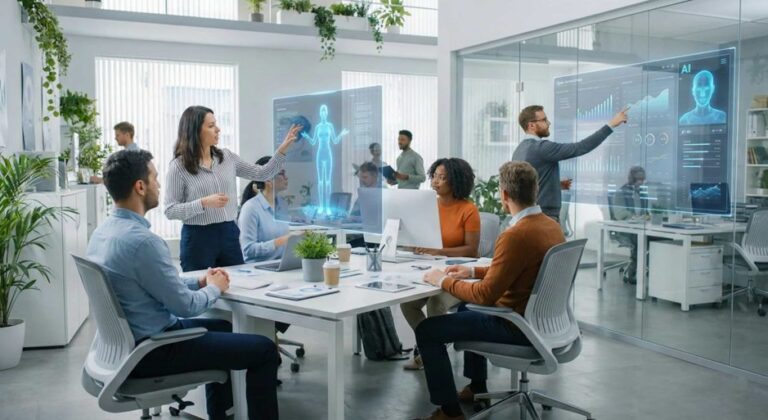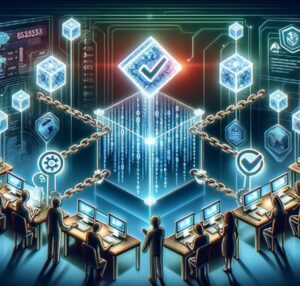Is 2024 ChatGPT revolution?
Is it the 2024 ChatGPT revolution that has brought change to society and business? The popularity of ChatGPT’s website has grown, securing its position among the top twenty most visited portals. ChatGPT’s website has been integrated into the most widely used search engines, social channels, media networks, Wikipedia, and e-commerce platforms like Amazon.com. People not only visit the portal (2.4 trillion times a month), but they also wait in queues to gain paid access to the most current version of the program. You can see the details here.
Not only professionals but everyone discusses what this means for society, for education, and naturally, what does this mean for business. If the openia.com portal is so popular, we can expect that they will monetize traffic with an ads system like others have done.
ChatGPT revolution in IT
ChatGPT has changed the lives of many professionals, like marketers and programmers. Should they now look for their own creative solutions, or is prompting and copy-pasting more productive? Some IT managers suggest replacing the coding process programmers do in a creation and code review process with the process of prompting and testing results, as it is much more effective than the traditional process. But even modernizing coding with the help of ChatGPT as an assistant, we can leverage efficiency.
ChatGPT revolution in creative industry
In the case of creativity, if you are a piano player, you must have some skills in your head and hands to play a melody, but when you apply ChatGPT, you should just know how to express what you want verbally or by typing. It creates a completely different level of creativity. Everyone can be a graphic designer, poet, or a music composer. We can find examples of hundreds of posts published in mere minutes or content generated automatically. Sometimes monetization of such an effort cannot be easy, but people try. People publish projects of AI-generated profiles on Instagram and other media which have gained millions of followers or subscribers. Does this give any value to society? Even authors call them SEO-content or SEO-purpose projects. ChatGPT revolution. You can see examples of hundreds of posts published in minutes or art effort cannot be monetized easy
ChatGPT in business planning
At least some areas of AI can influence business in the near future:
- Risk management, investment protection, and monetization, as well as scaling.
- Business continuation practices, efficiency and effectiveness, and business resilience.
- Customer service models, customer experience, and value creation or value devastation.
- Management role both as the people managing and the technology promoters for management. Trend and bandery setters. Mind and machine desclimers.
- Digitalization and augmentation, extended reality, and secure privacy.

Most probably, all these five takeaways require rethinking principles and budget reengineering. Build resources to be updated on a strategy level and on operational procedures so as to not lose market position. A passive business analyst team will not satisfy this need. CEOs should get clear directions about market trends and areas they need to improve. If analysts use ChatGPT revolution, the explainability problem becomes, that is why analysts should understand business and economy.
Companies will face the problem of determining which talents they must retain as key resources for maintaining competitiveness. The mix of analytical skills, open-minded thinking, and machine utilization looks promising for the market. The most important factors for the company to consider when selecting technology to drive business are:
- Adaptability to business criteria
- Ability to suport innovations in key business areas
- Reduce redundancy
- Capture value
The deployment of such a solution becomes critical for the business. A term that has emerged is Digital Employee Experience, representing the blend of utilitarian aspects of solutions in use within the company with people’s roles in value creation for business development and human well-being in such circumstances.
Digital Employee Experience (DEX) refers to the overall experience employees have with digital technologies and tools within an organization. It encompasses various aspects of the employee’s interaction with digital systems, applications, and devices throughout their workday. DEX aims to enhance productivity, engagement, and overall satisfaction by providing a positive and effective digital working environment.
Key elements of Digital Employee Experience may include:
- User-Friendly Interfaces: Ensuring that digital tools and interfaces are intuitive and easy to use, promoting efficiency in completing tasks.
- Collaboration Tools: Integration of digital platforms that facilitate communication and collaboration among employees, regardless of their physical location.
- Mobile Accessibility: Support for employees to access digital tools and information from various devices, promoting flexibility and remote work capabilities.
- Employee Well-being: Incorporating features that support employee well-being, such as tools for stress management, mental health resources, and work-life balance solutions.
- Training and Development Platforms: Offering digital resources for continuous learning, skill development, and career advancement.
- Performance Monitoring and Feedback: Implementing digital systems for tracking and assessing employee performance, providing constructive feedback, and facilitating performance reviews.
- Automation and AI Integration: Leveraging automation and artificial intelligence to streamline processes, reduce manual tasks, and enhance overall efficiency.
- Data Security and Privacy: Ensuring that digital systems prioritize the security and privacy of employee data and sensitive information.
- Feedback Mechanisms: Establishing channels for employees to provide feedback on digital tools, allowing organizations to make improvements based on user insights.
- Personalization: Tailoring digital experiences to individual employee needs, preferences, and roles within the organization.
It’s important to note that the concept of Digital Employee Experience continues to evolve as technology advances and organizational priorities shift. For the latest developments and trends, it’s recommended to explore recent publications, industry reports, and expert discussions in the field of digital workplace and employee experience.
Analysts could play an important role in such an environment.








